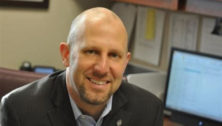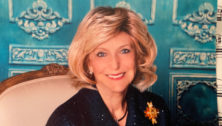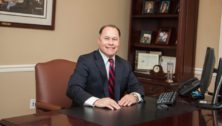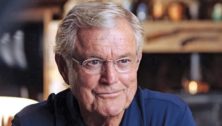Bucks County Leadership: Jeane M. Vidoni, President & CEO of Penn Community Bank
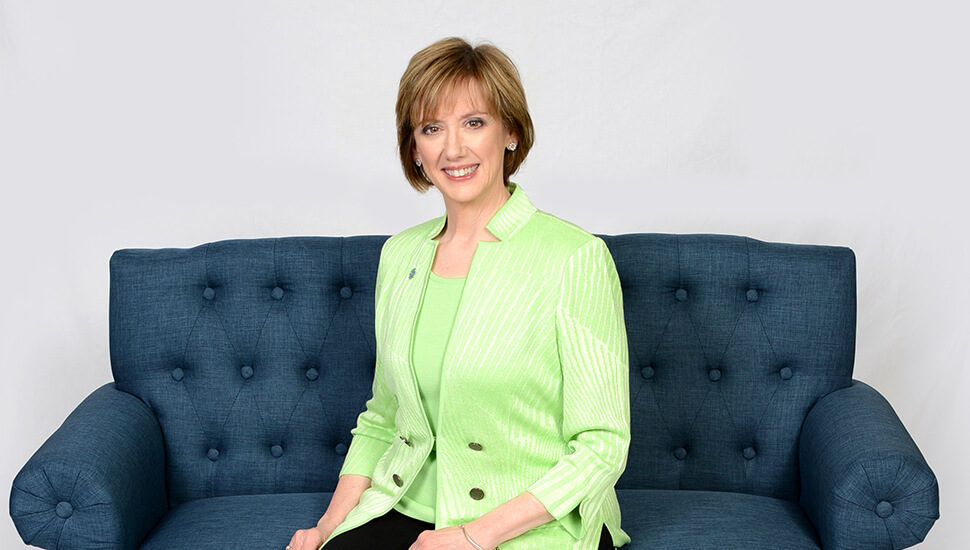

Jeane Vidoni, the CEO of Penn Community Bank, spoke with BUCKSCO Today about being born in Cleveland and growing up in Allentown; being inspired by the compassion and tolerance her father displayed as her mother suffered from an untreated mental illness; getting her license and a job on her 16th birthday, and working full-time at an advertising agency while going to college part-time.
Vidoni also discussed what she is currently focused on and Penn Community Bank’s priorities; the different branding phrases that her staff uses to describe the bank and its mission; and two great pieces of advice that she’ll never forget.
Where were you born and where did you grow up, Jeane?
While I was born in Cleveland, Ohio, but I grew up in Allentown, Pennsylvania. I don’t have many memories of Cleveland, but I do have many from my childhood in the Lehigh Valley. I was the youngest of three children and the only girl. My brothers were six and nine years older, so in many ways, I often felt like an only child.
What did your parents do?
My father grew up on coal mining property in Wheeling, West Virginia, and served in the Navy during World War II. He went to West Virginia University on the G.I. Bill when he returned and became an electrical engineer. When I was five years old, he moved the family to Allentown to work at Rodale Manufacturing in Emmaus. He became a plant manager and had a distinguished career. In the late 70s, he even traveled to China to visit factories and bring processes and strategy back to Pennsylvania.
My mom suffered from untreated mental illness and was barely functioning when I was growing up. At the time there were not a lot of services nor much understanding of mental health. So, my dad played the role of both parents, doing what he could, and always in the most loving way. Sometimes I see my unconventional upbringing as a gift because I learned early on how to navigate difficult circumstances.
What lessons did you take from that experience?
Many – if not most – people grow up with some dysfunction in their environment, myself included. But as a result, I learned how to read the room and how to keep things calm. Those are skills of perception and control.
From my father, I learned ideals of compassion, resilience, acceptance, and inspiration to never give up. Perhaps the greatest lesson I learned is to hold my own and not get thrown easily – and that has been a real gift from a leadership perspective.
What memories do you have of growing up in Allentown?
My best girlfriend Laurie and I used to take the bus to Hess’s Department Store and hang out! Hess’s was popular, and that was our Saturday activity.
I was an energetic maverick even back in high school. Laurie and I would interview rock bands for our school newspaper, Parkland High School Student Paper. I wish I would have saved those papers; maybe one of my fellow 1978 graduates has a copy or two they could share with me!
The Allentown Fairgrounds would bring well-known acts and we were there for the action. Just think – we performed celebrity interviews at the age of fourteen and fifteen. And we didn’t stop at just one or two interviews. We called the local radio station – where they were interviewing lesser-known bands and asked if we could do interviews for them. It became our thing. My father would drive us to and from the interviews and shows.
That gumption of dreaming up the idea – and then having the grit to figure out how to execute on it – that’s what I’m talking about. We had a cassette and a tape recorder, and we fancied ourselves two serious journalists! The gumption, the grit, the confidence – all swirled together. Honestly, I kick myself for not saving those interviews. And by the way, Laurie and I are still great friends!
What types of bands did you interview?
Some big names! The two I remember best are KISS and Blue Oyster Cult. Can you believe it?!
Where does your gumption come from?
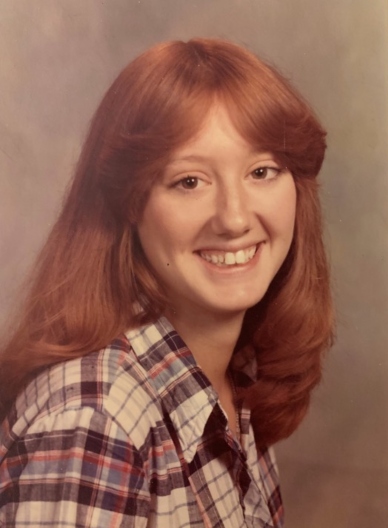
Part nature and part nurture. I suppose I got a great deal of it from my father. I also discovered and developed my own brand of independence. Sometimes challenge and adversity bring out persistence and determination. When coupled with compassion, these qualities can create stunningly giving and creative people.
In my own life, many people stepped in and provided mentoring and nurturing along the way. I am forever grateful for my personal community of supporters who served as role models in a loving way. Now, in my role as President and CEO, I believe it’s my responsibility – my calling even – to pay it forward and help instill the same gumption in the next generation of leaders.
Did you play any sports in high school?
No, I was not an athlete – I was more of a socialite. Even back then I enjoyed interacting with people, was gregarious, and always mature. I got my driver’s license on my 16th birthday and found a job right away.
Now, my first job only lasted a month because I didn’t know how to make an ice-cream cone without it falling over. My second job was at Bamberger’s, now Macy’s, selling handbags and hosiery. I was promoted to a part-time management position very quickly, and I think that’s because they noticed and encouraged my innate skills.
Did you go to college?
I initially went to college for one year full-time at Lehigh Valley Community College. It was the only place I could get into – though I was accepted at Penn State marginally. I was smart and did well in school as a young child, but later I was more focused on socializing and being a teenager. Plus, I was getting promoted at my job and I wanted to stick with that.
The first year of college I had a 3.8 GPA and then I got a job at an advertising agency called Lieberman Appalucci. They paid for half my tuition and all my books, and I soon transferred to Muhlenberg College. I worked full-time and went to class part-time at night and at lunchtime. It took me only one extra year to get my undergraduate degree. Then I went on to earn my master’s degree from St. Joseph’s part-time while working in banking and raising my twin sons.
What is it about learning that excites you?
I am curious and a lifelong learner. On any given day I am somewhere in the middle of 10 or 12 books. I connect the dots from different books and apply them to life. Generally, my preference is nonfiction, and I am particularly interested in brain science. I have been meditating every day for about four years. I am fascinated by how our thoughts translate into emotions and actions every day.
After you finished your undergraduate degree who were the people who saw promise in you and opened doors?
When I was at the ad agency we had a bank as a client. I got involved in helping to buy advertising media time, so I learned a bit about banking. When I graduated in the summer of 1983, I got a job as their advertising officer at First National Bank of Allentown. It was a real gift and a vote of confidence.
What do you think they saw in you coming out of college?
I had a combination of experience and assertiveness that bank leadership assessed as valuable. Shortly after I started at First National Bank of Allentown, we were acquired by Reading-based Meridian Bank. I like to talk about that experience because it was then that I learned the value of a strong organizational culture.
Almost anyone who worked at that bank will tell you the same thing. Their executive team was devoted and committed to educating us and to rotating us into positions in which we had little or no experience. I was 25- or 26-years old working on selling credit card portfolios. Growth and development were embedded in the culture. I was dropped into new departments, and I thrived. I am not a strict rule follower, so this open road suited me perfectly. I explored, I created, I learned. Even now I appreciate that experience for the balance of breadth and depth in my knowledge base. I built my résumé in those years and that contributed to my journey and my success today.
Any individuals who helped you along the way?
A key person in my early career development was a gentleman named Tom Strohm, also a former Meridian Bank senior executive.
When I had my twin sons, I quit banking and went to work part-time at the YMCA doing some marketing. When my twins were thirteen months old, Tom called me to offer me a position in a new banking department called product management and promotion. I told him I only knew 60% of the job description, and he said he would teach me the rest. I went back to work full-time in that position when my twins were a little over a year old.
To this day, Tom and I still have dinner and talk about that moment. If he didn’t reach out, I don’t think I would be on the same trajectory as I am today. He was so committed – he saw an aptitude and was willing to take the time to teach me.
Have you always delivered results and accomplished things beyond expectation?
I don’t know if I would go that far! But in all seriousness, when things don’t work out as expected or hoped, I know the next turn to take. I think half the battle is navigation, and the other half is strength and resilience. You need to be willing to take a risk, knowing things may not go perfectly and have the courage to assess and change courses when that’s indicated. Digging in your heels does not move you forward. Staying nimble and pivoting, lets you move forward.
What are you focused on? What are your priorities?
I think all of us were dealt an unprecedented challenge in March 2020 when this pandemic began. For us, particularly in banking and with a community bank, the upside was the trajectory of adoption of technology increased dramatically. Even more senior customers quickly figured out how to deposit a check with their phone and how to get online to do their banking.
Leveraging automation to help people and to give us more time to connect interpersonally is critical. Penn Community Bank is a relationship-driven bank. That’s not going away anytime soon, so figuring out how to integrate technology and personal touch is important.
An unexpected benefit for most community banks brought on by the pandemic is that while people were scared and worried, they wanted to feel personally connected to their bankers. We saw this in action with business customers – large and small – as they sought financial relief through the very complex federal Paycheck Protection Program. Many large national banks were unable to react in a personal way. And that’s when community institutions, like Penn Community Bank, stepped up. Throughout the pandemic, we have repeatedly heard about our role in helping customers and local officials. This was felt deeply by the markets we serve.
What initiative do you have to bring that mission into play from a business perspective?
We are not publicly traded, so we don’t have to pay attention to the quarterly earnings target for outside investors. That gives us a little more of a longer-term view. We are a slow and steady growing bank interested in serving the markets we are in.
As the largest mutual bank in the region, we are expanding further into Montgomery County with a new office coming to Lansdale in 2022. We also have an interest in the Lehigh Valley. We select our markets based upon a lot of data and trends, but ultimately where we believe the essence of a true community bank model will resonate. This is where we feel we can enter, be ourselves, and live our mission of helping customers and businesses areas grow and thrive.
How would you describe Penn Community Bank?
We use a couple of “branding phrases” to talk about ourselves. When we talk about them, our behavior comes before the phrases. We always say we don’t need to make up a marketing story. We just need to describe what we are already doing and describe it in a lively way.
“Doing Business Backwards” is a phrase we use that puts people – team members and customers – ahead of profit. Rather than starting with a financial goal, we begin with the people and have proved over and over that profits follow.
“Greater Good Banking” is our commitment to serving the greater good of our communities, customers, and local economies. We have a presence on over 40 boards. Volunteerism is very important. To us. We had waiting lists of team members for our Habitat for Humanity builds before COVID. It’s not just to get more business. It comes from the roots of our predecessor banks and it’s who we are today.
Another one is “Here We Grow.” It’s customers, it’s community, it’s us at the bank. Those phases are clever, and they are real.
What gives you hope?
My first thought is, love gives me hope. Perhaps a better way to say “love” is the idea of connecting to each other. At the same time, we navigate the economic and social world. True connections and friendships give me hope.
Finally, Jeane what’s the best piece of advice you ever got.
I suppose there are two pieces of advice that share the title of “best.” One is about inaction and the other is about taking action. The first, from my father, was the expression “This too shall pass.” I relate that to being unflappable and resilient. When things are going wild around me, I stay calm.
Now let’s go to the other best piece of advice, as you know I am always ready for action. I worked with a female bank executive pioneer, Sue Perrotty. Early in my career, I asked why someone else had gotten promoted. She looked me in the eye and replied, “Eyes front, sister!” I knew then that I could not spend my energy looking backward, over, or across. The key is to make your own plan, focus forward, and take action.
Connect With Your Community
Subscribe for stories that matter!
"*" indicates required fields


























